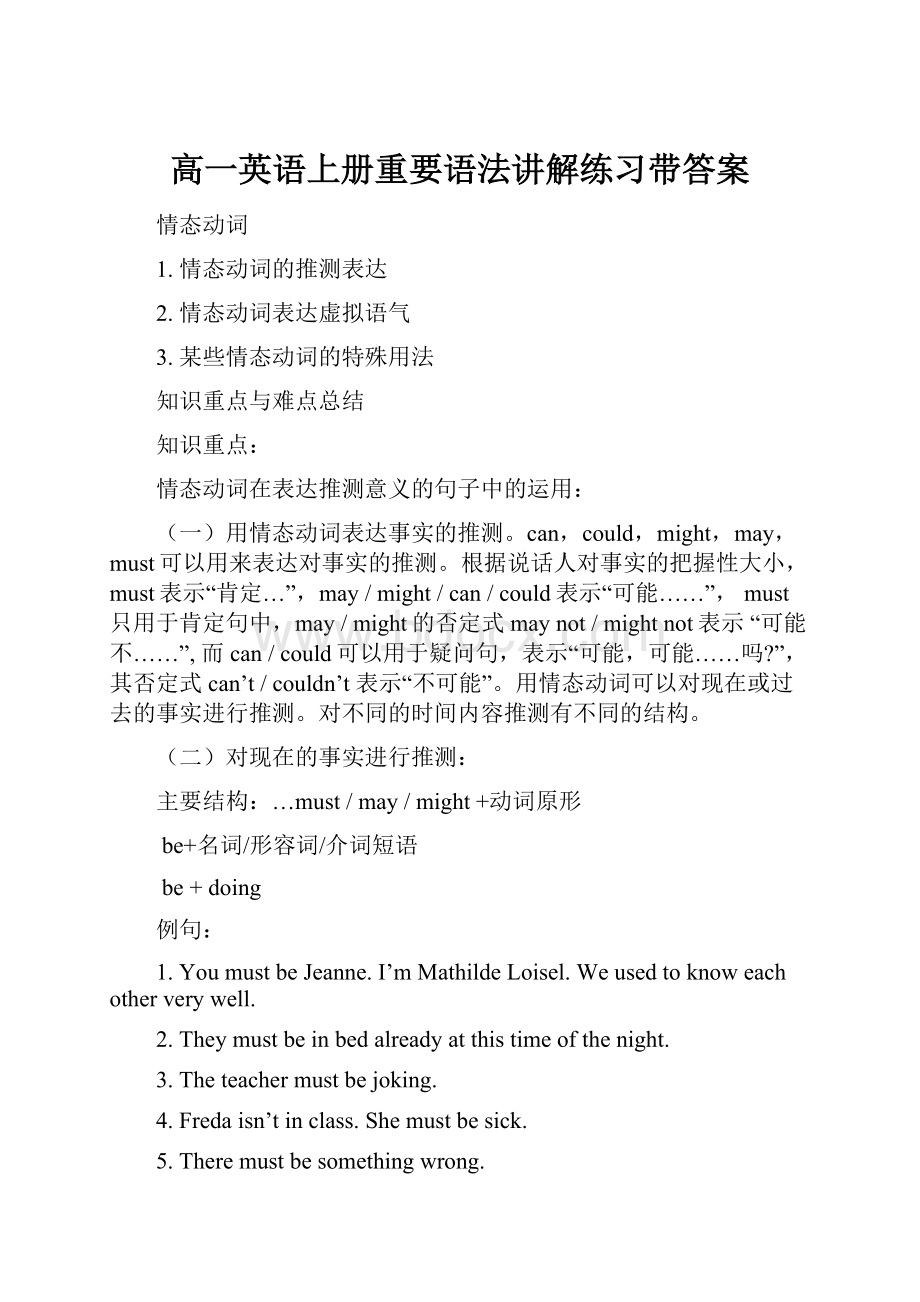高一英语上册重要语法讲解练习带答案.docx
《高一英语上册重要语法讲解练习带答案.docx》由会员分享,可在线阅读,更多相关《高一英语上册重要语法讲解练习带答案.docx(21页珍藏版)》请在冰豆网上搜索。

高一英语上册重要语法讲解练习带答案
情态动词
1.情态动词的推测表达
2.情态动词表达虚拟语气
3.某些情态动词的特殊用法
知识重点与难点总结
知识重点:
情态动词在表达推测意义的句子中的运用:
(一)用情态动词表达事实的推测。
can,could,might,may,must可以用来表达对事实的推测。
根据说话人对事实的把握性大小,must表示“肯定…”,may/might/can/could表示“可能……”,must只用于肯定句中,may/might的否定式maynot/mightnot表示“可能不……”,而can/could可以用于疑问句,表示“可能,可能……吗?
”,其否定式can’t/couldn’t表示“不可能”。
用情态动词可以对现在或过去的事实进行推测。
对不同的时间内容推测有不同的结构。
(二)对现在的事实进行推测:
主要结构:
…must/may/might+动词原形
be+名词/形容词/介词短语
be+doing
例句:
1.YoumustbeJeanne.I’mMathildeLoisel.Weusedtoknoweachotherverywell.
2.Theymustbeinbedalreadyatthistimeofthenight.
3.Theteachermustbejoking.
4.Fredaisn’tinclass.Shemustbesick.
5.Theremustbesomethingwrong.
6.Shemightbeveryclever,butshehasn’tgotmuchcommonsense.
7.Hemaybearrivingthisevening.
8.Hemaybetravelingaroundtheworld.
9.Thekeyscan’tbeintheroom.Ihavejustsearcheditverycarefully.
10.Canthenewsbetrue?
(三)对过去的事实进行推测:
结构:
情态动词+havedone/been+名词/形容词/介词短语
例句:
1.Mrs.Longmansmusthavebeenaprettygirlinheryouth.
2.Hecouldn’thaveseenAnnayesterday.She’sgoneabroad.
3.IthinkImusthaveleftmyglassesinthelibrary.
4.Hemighthaveoversleptagain.
5.WherecanTomhavegone?
情态动词表达虚拟语气:
表达“本来…”,“不然早就…”。
这是情态动词的一种虚拟语气用法。
表示说话人所讲的与所发生的事实相反。
表达了说话人的埋怨,后悔的语气。
其结构是在一些情态动词后面加havedone结构。
根据要表达的意思,有如下结构:
shouldhavedone/oughttohavedone:
本应该……
shouldn’thavedone/oughtn’ttohavedone:
本不该……
couldhavedone:
本来可以……
needn’thavedone:
本来没必要……
wouldliketohavedone:
本来很想……
wouldrathernothavedone:
本来不愿意……
could/might/havedone:
不然早就……
例句:
1.Youshouldn’thavelaughedathismistakes.
2.Youcouldhavetoldusearlier.
3.Ioughttohaveboughtthatdictionarylastweek.
4.Yououghtnottohavespentsomuchtimeinreadingnovels.
5.Weneednothavebeeninatearinghurrytocatchthetrain.
6.Theywouldliketohaveseenthatfilmlastfilm.
7.Ifhehadgivenmehisnumber,Icouldhavetelephonedhim.
8.Theymighthavebeenfrozentodeathbutfortherescueintime.
知识难点:
某些情态动词的特殊用法:
need和dare的两种形式的用法
need和dare可以用做实义动词,后面接不定式(todo)结构,在疑问句和否定句中,加助动词do/does/did/或don’t/doesn’t/didn’t。
作为情态动词使用时,主要用于疑问句和否定句中。
情态动词needn’t(没有必要,不必)相当于don’thaveto
例句:
1.Itiscold,youneedtowearsomewarmclothes.
2.NeedIstayherewithyouforawhile?
Thankyou,youneedn’t.
3.Howdareyouspeaktoparentslikethat?
注意:
句型Idaresay+从句。
意思是:
我肯定……=I’msure或Thereisnodoubtthat+从句。
例句:
IdaresaythatmyunclewillgetthemoneyifIdie.
will和would
表示“意志”或“愿意”,would则指过去愿意做……
例句:
1.Hesaidthathewouldhelpus.
2.Youmaytelephoneifyouwillacceptthisjob.
would可以表达“过去习惯做……”类似于“usedtodo”
例句:
1.Whenwewerechildren,wewouldgoswimmingeverysummerinthatriver.
表示请求,固定的句型:
Will/Wouldyoupleasedo…?
/Wouldyouliketodo…?
例句:
Will/Wouldyoupleasegivehimamessagewhenyouseehim?
shall
1.用于第一,三人称,表示“请求”;“建议”或“推荐”
例句:
1.Shallwestartthemeetingnow?
2.ShallIwatchTVnow?
3.Shallmysoncarrythecaseforyou?
2.用于第二人称,表示“命令,“要求”,“许诺”
例句:
1.Youshalltakewhateveryoulike.
2.Youshallnotgotothepartywithmeifyoumakesomuchnoiseagain.
在表示推测的否定句或疑问句中,常用can/can’t/could/couldn’t表示,意思是:
“可能…吗?
”;“…不可能…”。
而不能使用mustn’t或must等词。
【典型例题】
1.—Doyouthinkhewilldomeafavor?
—AsfarasIknow,heisthelastonetohelpothers.He_____bepreparedtogiveyouahand,though.
A.mightB.mustC.canD.should
分析:
本题考查情态动词推测性用法。
根据heisthelastonetohelpothers.(他是最不可能帮助别人的人),既然如此,那么“帮助你”的可能性也就最小了。
答案为A
2.—Look,someoneiscoming.Guesswhoit____be?
—Ithinkit___beTom.
—Idon’tthinkit___be____.
A.can;must;can;heB.may;can;must;him
C.must;can;must;hisD.might;must;can;himself
分析:
根据备选答案。
can表示推测时用于疑问句或否定句中。
本题首句就应该是Guesswhocanitbe?
第二句应该是IthinkitmustbeTom.(说话人十分肯定)。
第三句表达了说话人对前一个人的否定。
即:
Idon’tthinkitcanbehim/he.(不可能是他)。
答案为A
3.—DoyouknowMs.Wanglikeswalkingaftersupper?
—Sure.She____aroundthecampusnow.
A.mustbewalkingB.mustwalk
C.maywalkD.maybewalking
分析:
关键词Sure告诉我们说话人的口气十分肯定。
根据句子语境:
她此刻肯定正在校园散步呢。
mustbedoing表示肯定正在做。
答案为A
4.—IstayedatahotelinNewYork.
—Oh,didyou?
You_____withBarbara.
A.couldhavestayedB.couldstayC.wouldsayD.musthavestayed
分析:
首句说:
我在纽约住在一家宾馆里。
在此ahotel是泛指。
所以D选项不合题意。
第二句在说:
你本来可以和Barbara.住在一起的。
Couldhavedone表示:
本来可以。
答案为A
5.Whydidn’tyoutellmetherewasnomeetingtoday?
I_____allthewayherethroughtheheavysnow.
A.needn’thavedrivenB.can’thavedriven
C.mustn’thavedrivenD.shouldn’thavedriven
分析:
根据句意:
你为什么不告诉我今天没有会?
我本来没必要冒着大雪开车跑这么多路。
Needn’thavedone表示本来没必要。
答案为A
6.Iwasreallyanxiousaboutyou.You_____homewithoutaword.
A.mustn’tleaveB.shouldn’thaveleft
C.couldn’thaveleftD.needn’tleave
分析:
根据句意:
我真的很担心你,你真不应该一句话都不说就离开家。
“离开家”已经发生了。
Shouldhavedone正好表达了本句的意思。
答案为B
7.A:
AreyoucomingtoJeff’sparty?
B:
I’mnotsure.I_____gototheconcertinstead.
A.mustB.wouldC.shouldD.might
分析:
根据B的回答:
我不一定去,我有可能去听音乐会。
Might表示推测:
可能。
答案为D
8.A:
Ipromisethatshe____getanicepresentonherbirthday.
B:
Willitbeabigsurprisetoher?
A.shouldB.mustC.wouldD.shall
分析:
A说:
“我答应她在生日聚会上她会得到一份生日礼物。
shall表示许诺。
答案为D
【模拟试题】
5.—Ididn’tgotoworkyesterdayafternoonbecausemycarbrokedown.
—You_____mine.Iwasn’tusingit.
A.mightborrowB.couldhaveborrowed
C.canhaveborrowedD.oughttoborrow
6.—Amanansweredthephone.Isupposeitwasherhusband.
—It_____herhusband.Hehasbeendeadforages.
A.mustn’tbeB.couldn’thavebeen
C.maynothavebeenD.mustn’thavebeen
1.A:
IsJohncomingbytrain?
B:
Heshould,buthe_____not.Helikesdrivinghiscar.
A.mustB.canC.needD.may
2.Mr.White_____at8:
30forthemeeting,buthedidn’tshowup.
A.shouldhavearrivedB.shouldarrive
C.shouldhavehadarrivedD.shouldbearriving
3.Sorry,I’mlate.I_____haveturnedoffthealarmandgonetosleepagain.
A.mightB.shouldC.canD.will
4.You_____betired—You’veonlybeenworkingforanhour.
A.mustnotB.won’tC.can’tD.maynot
【试题答案】
1.分析:
根据B的回答“他应该(坐火车来),但是也不一定,他喜欢开自己的车。
本题考查了情态动词的推测用法。
may表示不十分有把握的推测。
答案为D
2.分析:
根据句意:
White先生本应该在8:
30到这里出席会议的,可他(在8:
30)没有到场。
Shouldhavedone表示:
本应该。
答案为A
3.分析:
本句是说话人在解释迟到的原因:
我或许是关掉闹钟又睡了。
mighthavedone表示对过去的推测:
可能已经……答案为A
4.分析:
根据后半句You’veonlybeenworkingforanhour.(你才刚干了一个小时)说明
You_____betired(你不可能很累),can’t表示“不可能”答案为C
5.分析:
听到对方说“昨天车坏了而没去上班”,第二个人说“你本来可以借我的车去
上班。
”本来可以/能:
couldhavedone.答案为B
6.分析:
第二个人是说:
那个人不可能是她丈夫,因为她丈夫已经去世多年了。
根据对
话的语境,是在谈论过去的事,表示过去不可能:
couldnothavedone答案为:
B
与it有关的主要句型
it强调句型
知识总结归纳:
(一)it用做形式主语或形式宾语:
根据句子结构的需要,it用做形式主语或形式宾语,而真正的主语或宾语(todo短语,doing短语,名词性从句)则放在句尾。
主要句型:
It’s+形容词/名词+连词+名词性从句
todosth.
doingsth.
find/make/think/feelit+形容词/名词+连词+名词性从句
todosth.
doingsth.
例句:
1.ItwillbecomemoreandmoreimportanttohaveagoodknowledgeofEnglish.
2.It’susualforclosefriendstohavesimilarideasandbeliefs.
3.It’sapitythatIdidn’tthinkofitearlier.
4.It’snousegoingtheresoearly.
5.Outteacherthinksitnogoodlearningwithoutpractice.
6.Didn’tImakeitcleartoyouthatIwasnotcoming?
7.Wefounditstrangethatnoonewouldtakethemoney.
(三)it在强调句型中:
在英语中,为了突出强调句子的某一个成分(谓语除外),达到强调或使听话人特别注意这一部分的目的。
便形成了一种强调句型。
Itis/was+被强调的部分+that/who+句子的其他部分。
Itis/wasnotuntil+时间+that+句子的其他部分。
例句:
1.IsawJohnonmywaytoschoolthismorning.
ItwasJohnwho/thatIsawonmywaytoschoolthismorning.
ItwasonmywaytoschoolthatIsawJohnthismorning.
ItwasthismorningthatIsawJohnonmywaytoschool.
2.ItwashisbestsuitthatJohnworetothedancelastnight.
3.Itwasnotuntil1920thatregularradiobroadcastbegan.
4.Itwasthestrangewaythingslookedandsoundedinmyfamiliarroomatnightthatfrightenedmesomuch.
5.Itwasthekindnessandsympathyintheireyesthatpreventedmefromdoingso.
(二)其他句型
1.Ittakes+时间段+sb.+todosth.
2.表示“据说,据报道,/人们认为/相信/建议等
It’ssaidthat…….
It’sreportedthat……
It’sbelieved/thought/suggestedthat……
例句:
3.It’ssuggestedthatweshouldhaveameetingtodiscusstheproblem.
4.Itwasoncepredicted(预测)thatBritishandAmericanEnglishwouldbecomeseparatelanguagesfinally.
1.Itgenerallytakestimetoreachthispoint—beingonthesamewavelength.
2.Itisbelievedthatthetwochildrenwentoffexploring(探险)ontheirownandgetstuckonthecliff.
知识难点:
(一)注意强调句型的变形,即以一般疑问句或特殊疑问句的形式出现的强调句型。
(二)是强调句型还是that主语从句或其他复合句
1.ItisafactthatEnglishisbeingacceptedasaninternationallanguage.
2.Itisthesepoisonousproductsthatcancausethesymptomsoftheflu,suchasheadacheandachingmuscles.
3.Itwasalmostteno’clockwhenoursoldierscamebackfromthefront.
4.Wasitinthisplacethatthelastkingdied?
1.WhatisitthatJoecan’tfindinthebathroom?
2.WherewasitthatyoumettheforeignguestsfromAustralia?
3.Ican’tquiterememberwhenitwasthatwemarried.
4.Wasitbecausehewasveryillthatheaskedforleave?
(三)注意强调句型中被强调部分带有定语从句
WasitattheairbattleonJune8,1944,whichwasledbyCaptainJohnsonthatPeterlosthislife.
【典型例题】
一.单项选择:
4.isafactthatEnglishisbeingacceptedasaninternationallanguage.
A.ThereB.ThisC.ThatD.It
分析:
本题考查it做形式主语的句型:
英语正在作为一种国际性语言被接受是一个事实。
选择D
5.Itwasinthesmallhouse___wasbuiltwithstonesbyhisfather___hespenthischildhood.
A.which;thatB.that;where
C.which;whichD.that;which
分析:
本题考查带有定语从句的强调句型用法。
句中:
“___wasbuiltwithstonesbyhisfather的定语从句。
被强调的部分是inthesmallhouse___wasbuiltwithstonesbyhisfather。
根据句意:
他正是在他父亲用石头盖的房子里度过了他的童年。
故选择A
1.Idon’tthinkposs